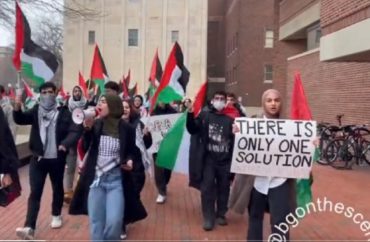
Since Oct. 7 we’ve seen endless rounds of pro-Hamas and pro-Palestinian students protesting on campuses across the country. Many of these protests have been quasi-violent. That is, they are not actually peaceful. They contain a threat of violence.
Those would include protests where students take over critical campus spaces, like entrance foyers, as happened at MIT, forcing Jewish students and others to go the long way around to get to classrooms. They include the protests in campus libraries, which interrupt the important student task of studying, as happened many places, including Harvard. They certainly include breaking glass windows and doors, and threatening the speech of invited campus lecturers, let alone roughing up Jewish students who were hosting the event, as happened at UC Berkeley in February.
While these cases all have significant antisemitic components, perhaps that is not the only lens through which to evaluate the out-of-control protests, because they qualify as bad behavior even without the added hate of antisemitism.
These actions have passed under the banner of “free speech,” which is a questionable designation. Free speech should be limited to speech – and not include the threat or fact of violent action. Nor does it make sense to call it “free speech” when the speech prevents the free speech of others who have assembled in a designated space. Whatever you call that, it is outside of what should be considered pure speech on campus.
After all, we live in a moment when not using someone’s preferred pronouns counts as violence.
In short, the scripts are getting old. People are getting tired of this disruption. Why, a reporter must ask, is nothing ever done to change the outcome? Why are the protesters never sufficiently afraid of punishment that they actually protest respectfully and back off when the time comes, having made their point?
The answer is obvious. They don’t back off because they don’t have to. And they don’t have to because historically there have been no punishments for the reality of disruption and the threat of violence to date.
Some universities appear to finally be cracking down, but it remains to be seen.
Early in March a group of 12 students at the University of Pennsylvania called Freedom School for Palestine protested at a board of trustees meeting. Reports vary, but they shut it down in about four minutes. The acting president of the university barely had time to welcome the trustees, The College Fix reported.
In addition to the heady power of pure disruption, Freedom School had some demands.
“We condemn the board of trustees’ support for the genocidal Israeli state, and we call on Penn administration to support Palestinian students, drop disciplinary charges against pro-Palestinian demonstrators and divest from genocide,” the group said in a statement.
Penn denies that it is invested in Israel. So the Palestinian students are, essentially, demanding that the university drop the well earned disciplinary charges they have accrued by their actions.
As of last week two pro-Palestinian tenured professors have sued UPenn to stop them from handing over internal documents to the U.S. House Committee on Education and the Work Force, which is investigating antisemitism on campus. The professors are afraid that the names of students and faculty who have been actively involved in the protests will be released. They are calling the committee’s actions “McCarthyite.”
It’s interesting that they are unhappy about the prospect of putting their names where their actions are. As with the students who protest that they are being disciplined for their actions, these professors ought to stand on their principles, instead of suing to ensure that their actions have no repercussions.
Interestingly, Columbia University, which has a long-standing tradition of antisemitism, is the one Ivy that really did punish pro-Palestinian groups for breaking rules about protesting. In November, after violating school rules, Students for Justice in Palestine and Jewish Voice for Peace were both suspended and defunded. So far so good. But as of last week the groups are suing Columbia for violating their rights. We’ll see if schools are allowed to have actual rules, and to enforce them.
Another case worth watching to see if punishment ever happens is UC Berkeley. In early March Berkeley’s president announced that the school would pursue criminal charges against protesters who shut down Israeli lawyer Ran Bar-Yoshafat on Feb. 26. The protesters broke doors and windows, physically attacked two Jewish students, and shut down the speech. They fomented a riot. The speech was rescheduled for this week.
It remains to be seen whether Berkeley does, in fact, pursue criminal charges. Doing so is the only way to stop the most egregious violent behavior on campus, and to restore the kind of order that students – and not just Jewish students – need to pursue their studies. If a few groups of students prefer to spend their college years in political protests over a war, that should not require that the entire student body go along with it.
MORE: UC Berkeley pledges criminal prosecution of pro-Palestinian rioters who shut down event
IMAGE: BG On the scene / Twitter
Like The College Fix on Facebook / Follow us on Twitter






Please join the conversation about our stories on Facebook, Twitter, Instagram, Reddit, MeWe, Rumble, Gab, Minds and Gettr.